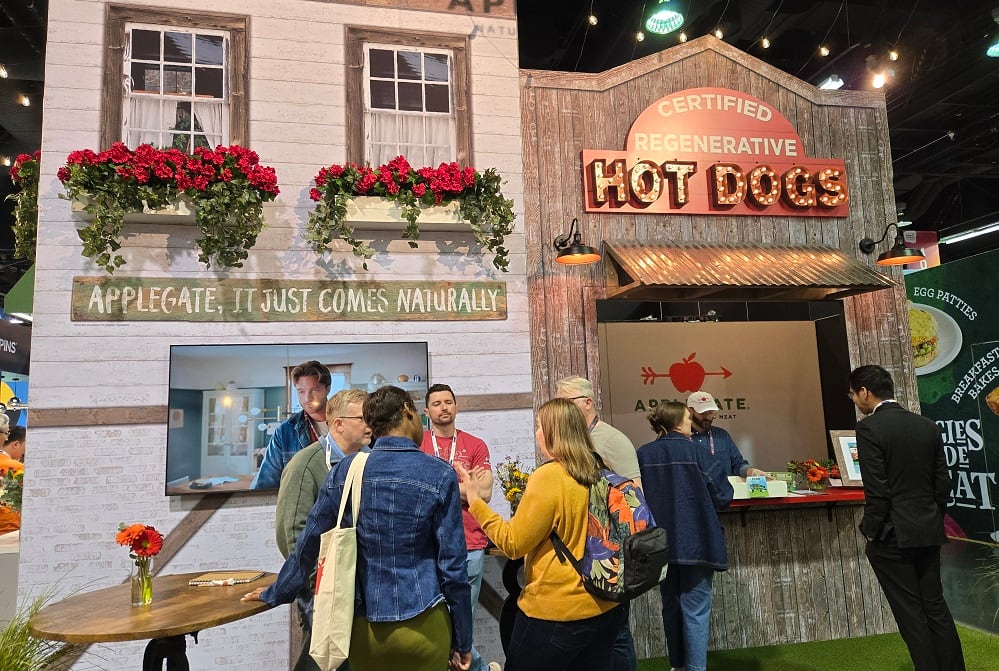Consumers may say they want more environmentally sustainable food, but market research shows taste, price and health consistently top their purchase priorities, which is why natural and organic meat brand Applegate Farms is taking the onus off shoppers to choose between products that are healthier for planet or healthier for their families and wallets.
A year after debuting the “Do Good Dog” made with regeneratively farmed beef, Applegate has transitioned to using beef from certified regenerative farms for all of its beef hotdogs so that consumers do not have to choose between regenerative, organic and other natural offerings at shelf.
“When we launched the Do Good Dog, we made consumers choose between regenerative, natural and organic hot dogs,” in part because at the time there was insufficient supply of certified regenerative beef, said Applegate President Joseph O’Connor.
But, he added, “we quickly realized that was a mistake.”
Reaching net zero: A roadmap to reduce emissions and increase nutrition security through strategic sourcing, manufacturing and packaging
This story is part of a special collection of articles examining how consumers, brands and reglators are thinking about climate action, including what is and isn't working in the quest to reduce Scope 3 emissions and improve environmental sustainability. The collection also explores how the food industry is balancing the health of people and the planet through ingredient innovation, modern manufacturing and sustainable packaging.
Check out the full collection.
To receive future special editions via email, register for free for FoodNavigator-USA's newsletters. Find out more by clicking the yellow 'register' button at the top of our homepage or by visiting https://www.foodnavigator-usa.com/Info/Why-register/
Senior Director of Mission and Advocacy Carolyn Gahn explained when consumers learned about the Do Good Dog “they were super interested,” but some still wanted the organic certification and others wanted the price point of the company’s other natural offerings.
“We realized asking them to make the choice was hard to do. And we realized that we are truly trying to have an impact then we just need to source regenerative and integrate it into our everyday beef hot dogs, so consumers do not have to make a choice. They just buy the product they know and love and now it is from certified regenerative farmland,” Gahn added.
Just as Applegate did not want consumers to choose between regenerative and organic hot dogs, it did not want them to choose a product based on price. As such, even though sourcing all regenerative beef is more expensive for the company, it did not change its prices.
“We just said, this was the right thing to do,” O’Connor said.
He explained he was “blown away” by the impact of regenerative agriculture on the farms and animals of the partners who practice it, and that Applegate wanted to use its size and scale to further that positive impact without passing the added cost on to consumers.
“If we truly are going to make a change, we realized we need to put our money where our mouth is and just transition our supply chain and bring that to consumers,” Gahn added.
Longer range planning and bigger commitments helped speed transition
To make this possible, the company needed to quickly scale its supply of certified regenerative beef, which it was able to do ahead of its original deadline by working with its existing partners.
When the company unveiled the Do Good Dog it declared its intention to source beef for all its hot dogs from certified regenerative farmland by the end of 2025. But within months of the new year, Applegate met its goal and now counts 10.8 million certified regenerative acres in its supply chain – a “huge transformation” from the 260,000 certified regenerative acres in its supply chain in 2021, Gahn said.
“The goal from the beginning was to work with our longstanding partners and suppliers to transition their supply to regenerative agriculture rather than going out and shopping for all new suppliers. It has been a slow process – it takes three years to become certified organic and then the extra mile to go regenerative. But now we have completed that transition and, as we grow, our supply chain will evolve and will continue to onboard new regenerative farms into that network,” she explained.
Applegate was able to transition its suppliers to regenerative agriculture practices ahead of schedule in part because it began planning longer range and making bigger commitments to ensure it would have the supply it needs, added O’Connor.
Simple messaging better resonates with consumers
The Do Good Dog pilot also allowed Applegate to test messaging around regenerative agriculture to find phrases and explanations that resonated with consumers.
“Regenerative agriculture is not a familiar term to most consumers, and initially when we came out with the Do Good Dog we tried to tell the whole story. My personal take at the time was it was too much. There was an overload of information. So, now we are just trying to simplify the messaging to say, ‘If you purchase this item you are contributing to enriched soil, water retention and, eventually, when all the data supports it, we could possibly talk about carbon sequestration. But we think if we simplify our messaging, we will reach consumers more,” said O’Connor.
This summer, Applegate will turbocharge its consumer education around regenerative agriculture with a campaign focused on its beef hotdogs and grilling season, which will include social media posts and other activations, he added.
Do regenerative agriculture practices produce healthier food?
As the company promotes adoption of regenerative agriculture, it also supports research into potential health benefits for people of the practice.
“We are not making heath claims with it yet, but we are collecting data with partners across the industry” to test the nutrient density of raw beef from cattle raised with regenerative agriculture practices versus those from conventionally raised cattle, Gahn said.
“We are also in the middle of a human health trail study that is with the Hormel Institute that is measuring human health biomarkers when participants consume a diet of grass fed regenerative, organic beef versus conventional. And that information will be really useful to us to understand the human health benefits and then where to invest further to gather more data on human health outcomes with the regenerative agriculture diet,” she added.
While Applegate started sourcing beef from farms that practice regenerative agriculture, it plans eventually to source other species from farms that practice regenerative agriculture so that it can one day launch pork and poultry products that support these planetary benefits, said Gahn.


